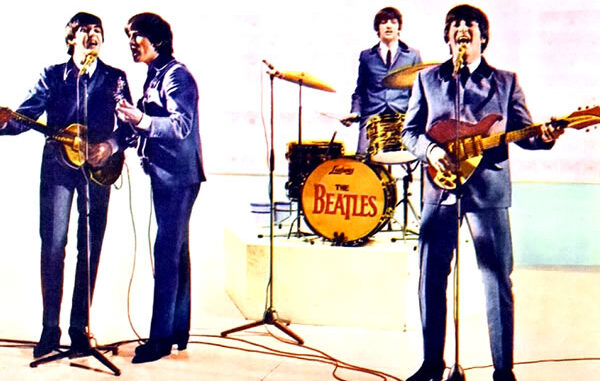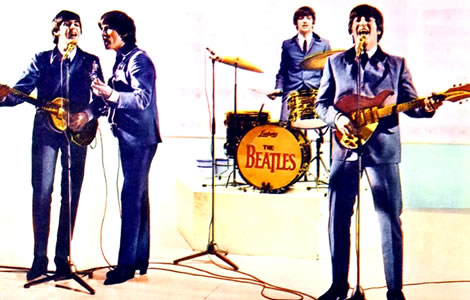
The early 1960s saw the meteoric rise of the Beatles, a band that would forever change the landscape of popular music and culture. Beatlemania, the intense fan frenzy directed towards the Beatles, emerged from their humble beginnings in Liverpool and took the world by storm between 1961 and 1964.

This period marked the transformation of the Beatles from local favourites to global icons, aided significantly by the managerial genius of Brian Epstein, their groundbreaking movies, and their electrifying tours.
The Background of the Band
The Beatles’ story began in Liverpool, England, where John Lennon formed a skiffle group called The Quarrymen in 1957. Paul McCartney joined shortly after, followed by George Harrison in 1958. The band underwent several name changes and lineup adjustments before settling on the Beatles in 1960. With Pete Best as their drummer, they honed their craft in the clubs of Hamburg, Germany, playing long sets that helped them develop their distinctive sound and stage presence.
By late 1961, the Beatles had returned to Liverpool and were performing regularly at the Cavern Club. Their energetic performances and charismatic personalities quickly garnered a loyal local following. However, it was their meeting with Brian Epstein, a local record store manager, that would propel them to new heights.
The Success and Work of Brian Epstein
Brian Epstein discovered the Beatles in November 1961 and was immediately struck by their potential. He became their manager in January 1962, bringing a new level of professionalism and ambition to the band. Epstein’s belief in the Beatles was unwavering, and he worked tirelessly to secure them a recording contract, eventually succeeding with EMI’s Parlophone label under producer George Martin.
One of Epstein’s first significant changes was replacing Pete Best with Ringo Starr in August 1962, solidifying the lineup of John Lennon, Paul McCartney, George Harrison, and Ringo Starr. This change proved crucial as Ringo’s drumming and personality perfectly complemented the group.
Under Epstein’s guidance, the Beatles adopted a more polished image, donning suits and ties, and refining their stage presence. Epstein’s promotional efforts and relentless pursuit of opportunities paid off when the Beatles released their first single, “Love Me Do,” in October 1962. It reached number 17 on the UK charts, signalling the start of their rise to fame.
The Breakthrough and Beatlemania
1963 was the breakthrough year for the Beatles. Their second single, “Please Please Me,” released in January, soared to the top of the charts, followed by their debut album of the same name in March. The album was a massive success, remaining at number one for 30 weeks. The Beatles’ infectious melodies, harmonies, and charismatic performances resonated deeply with the youth, creating an unprecedented wave of enthusiasm.
The term “Beatlemania” was coined to describe the frenzy that surrounded the band. Their concerts were characterised by screaming fans, often drowning out the music. In 1963, the Beatles released several more hit singles, including “From Me to You,” “She Loves You,” and “I Want to Hold Your Hand,” each contributing to their growing popularity.
Movies and Worldwide Trips
Capitalising on their fame, the Beatles ventured into films. “A Hard Day’s Night,” released in 1964, was a fictionalised account of a day in the life of the band. Directed by Richard Lester, the film was both a critical and commercial success, showcasing the Beatles’ wit and charm while further cementing their cultural impact. The movie’s soundtrack, featuring hits like “A Hard Day’s Night” and “Can’t Buy Me Love,” topped the charts.
Their second film, “Help!,” released in 1965, continued their foray into cinema. While less critically acclaimed than its predecessor, “Help!” was still a commercial success and added to their global appeal. The Beatles’ films not only entertained but also provided a glimpse into their personalities, endearing them to fans worldwide.
The US Tour and Worldwide Impact
The Beatles’ conquest of America began in earnest with their appearance on “The Ed Sullivan Show” on February 9, 1964. Viewed by an estimated 73 million people, the performance marked a pivotal moment in their career. The Beatles’ charm, style, and music captivated American audiences, leading to an explosion of popularity in the US.
Their first US tour in 1964 was a resounding success, with sell-out concerts and frenzied fans greeting them at every stop. The tour included performances at iconic venues like the Washington Coliseum and Carnegie Hall and culminated in a historic concert at the Hollywood Bowl. The Beatles’ ability to connect with audiences transcended cultural and geographical boundaries, making them a global phenomenon.
Following their success in the US, the Beatles embarked on tours to other parts of the world, including Australia, New Zealand, Hong Kong, and Scandinavia. Everywhere they went, they were met with adoration and hysteria, solidifying their status as international superstars.
Capitol fm plays all your Beatles favourites today
From 1961 to 1964, the Beatles experienced a whirlwind of success and transformation. Brian Epstein’s management, their groundbreaking music, and their ventures into film and international tours all played crucial roles in their rise to global stardom. Beatlemania was not just a fleeting moment in pop culture; it was a revolution that changed the face of music and left an indelible mark on the world. The Beatles’ influence continues to be felt today, a testament to their enduring legacy and the timeless appeal of their music.
